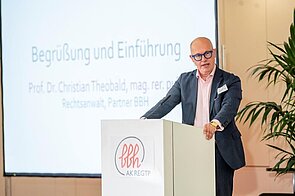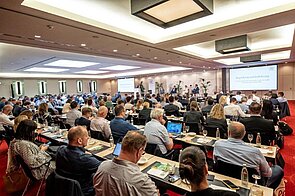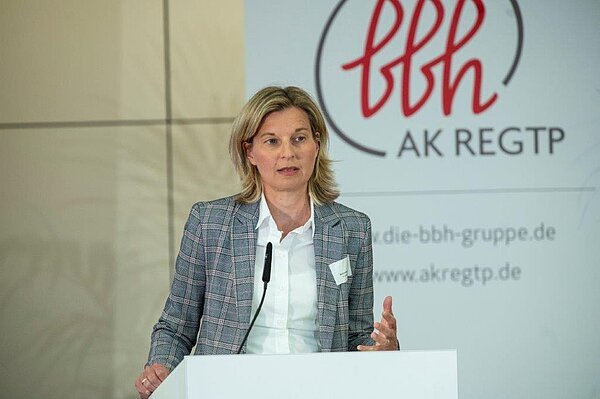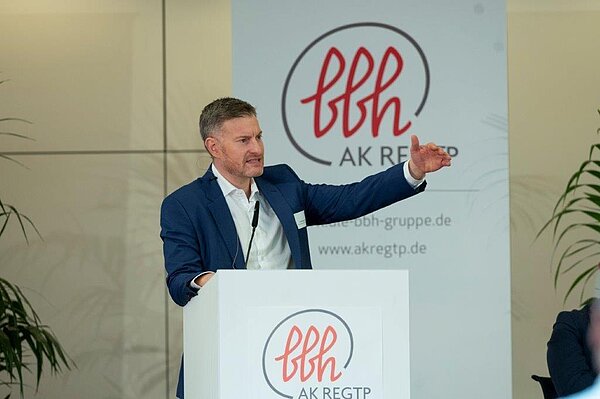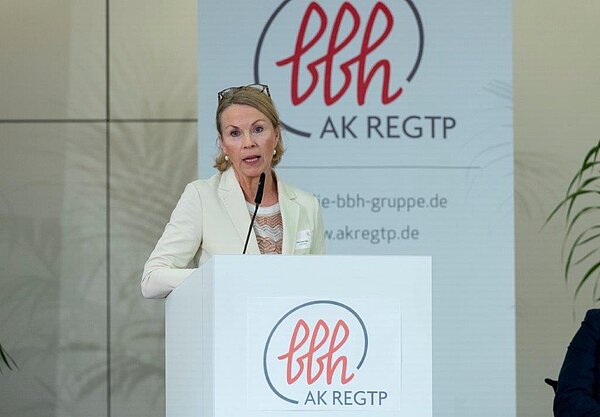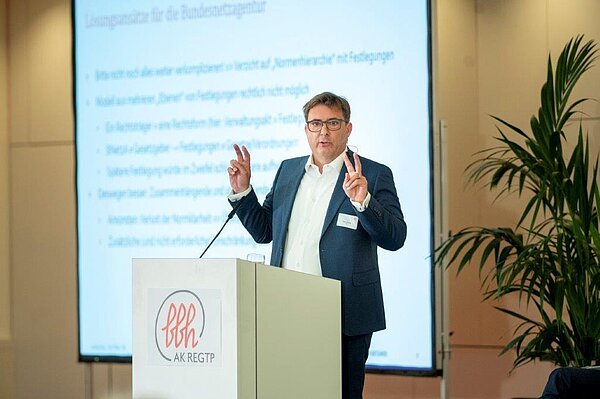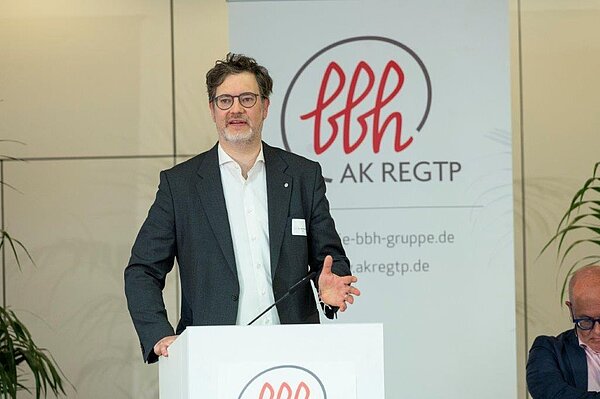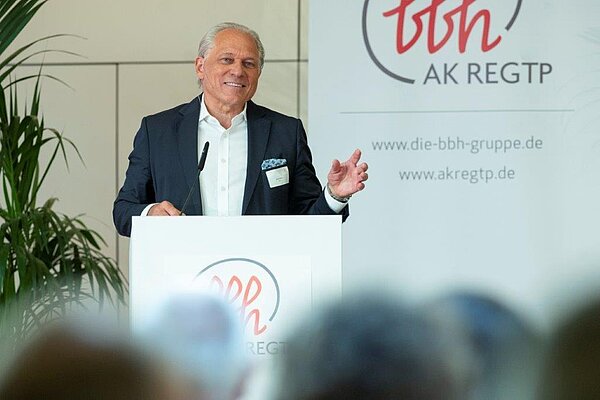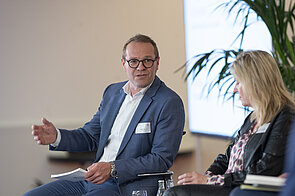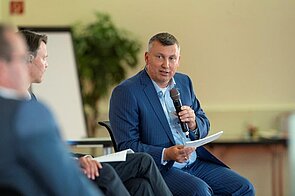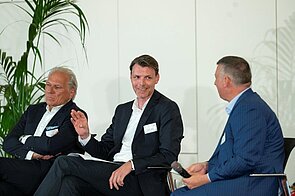Prof. Dr. Christian Theobald © Marc S. Unger
© Marc Steffen Unger
“The amended Energy Industry Act (EnWG) – an epochal change in regulation” was the motto of the morning session opened by Barbie Kornelia Haller, Vice President of the Federal Network Agency, who reported on the future regulation from the perspective of the regulatory authority she represented. The Federal Network Agency itself is now in charge of the regulatory framework. “This is a turning point for the German energy regulation”, said Haller. After outlining the efforts that all energy industry stakeholders will have to make if Germany is to be climate-neutral by 2045, she took up the question that most conference participants were interested in: How will the Federal Network Agency shape the regulatory framework? What will Regulation 2.0 look like? The Vice President of the Federal Network Agency first described the regulatory authority’s new structure: A “Grand Ruling Chamber for Energy” has been established and two levels of determinations are being introduced – framework determinations and methodology determinations. All of this is intended to make the regulatory system simpler, easier to understand and faster. At the same time, Haller made it clear that “the grid operators have always been charged with the task of forward-looking grid expansion”. She added that neglecting these duties will now have consequences.
Dr. Kai Roger Lobo, Deputy Director General of the German Association of Local Public Utilities (VKU), then described the future grid regulation from the perspective of distribution system operators. He began his speech with praise for the Federal Network Agency, saying that it had so far performed its new role “with flying colours and sound judgment”. Nevertheless, he pointed out that grid operators will need to make huge investments, which will result in higher grid charges. While the grid connection process can be accelerated, grid operators are reaching their limits when it comes to the physical expansion of grids. But despite all the difficulties, he finds that “forward-looking grid expansion has always been common practice in the distribution system sector”.
“The future regulatory practice from the perspective of case law” was examined by Anne-Christin Frister, presiding judge of the Cartel Penal at the Higher Regional Court (OLG) Düsseldorf. First, she stated that the role of the Federal Network Agency will change fundamentally: “The regulatory authority will act as the legislator,” she said. In her assessment of the Federal Network Agency’s work to date, Frister joined the previous speaker’s praise for the Agency. She went on pointing out that it has not yet been clarified whether and to what extent the Federal Network Agency’s framework determinations can be challenged. She then summed up the concerns expressed by some of the observers about a lack of legal protection: “In the future, we will be dealing with an authority that acts on the basis of decision-making standards it has defined itself”. According to Frister, however, the Federal Network Agency will have to justify its actions and decisions in much more detail than before. “This expands the scope for judicial review in the early years of this new regulatory world”. Frister thus reassures the concerned observers: “There is no need to fear a regulatory authority that has unlimited room for manoeuvre and is subject to no control at all”.
BBH partner and lawyer Stefan Missling concluded the discussion with a lawyer’s perspective on the new regulatory system. He reminded the attendees that the ECJ judgment, which led to the Federal Network Agency’s new powers, could also have been interpreted and implemented differently by politicians. He went on to point out the shortcomings of the new regulatory model. He emphasised that going forward, the legal framework will be shaped by the Federal Network Agency, “the party laying down the rules is thus also the party applying them”. Missling sees this as a major limitation to effective legal protection. According to him, a super authority has been created “that passes its own laws, which cannot be challenged in court after the time for appeal, i.e. one month, has expired”. Missling, however, also offered hope, stating: “There is no shadow without light”. The solutions he proposed included a readjustment of the approach taken by the courts on general rulings and regulatory discretion as well as corrections by the legislator.
This was followed by an interjection from BBH partner and lawyer Dr. Olaf Däuper “On the transformation of gas grids”. According to him, fossil natural gas will no longer play a role by 2045. Gas grid operators have three options: to continue to use the grid with biogas, repurpose it for hydrogen or decomission it. All gas grid operators are facing major challenges. He addressed the participants saying: “All of you will have to manage a gas grid transformation project, so it’s best to start planning early”.
Prof. Dr. Christian Theobald opened the first panel of the conference day by expressing his respect for the Federal Network Agency, which is now taking on the complex task of having to create a new system from the shambles of the ECJ ruling. In this context, he emphasised that the courts need to take a different approach when dealing with determinations and general rulings. Anne-Christin Frister also thought this was conceivable. Barbie Kornelia Haller considered her task to consist in ensuring that the determinations stand up to legal scrutiny if challenged in court. Stefan Missling pointed out that the previous regulatory system contained standards that served as a reference. “Perhaps the courts will now have the courage to make substantive decisions based on the overall objectives”. Dr. Kai Roger Lobo was concerned that the Federal Network Agency would now be deciding on political matters, for example with regard to trade tax, with dramatic consequences for municipalities. According to him, this could lead to a decrease in the public acceptance of regulation. When asked by an attendee whether the objective of carbon neutrality by 2045 could be achieved, Haller gave an all official response: “That is the goal and I am working towards it”. Lobo considered the lack of investments to be the problem, which made for a smooth transition to the second half of the conference day.
The afternoon of the regulatory conference was dedicated to “Requirements for the financial transition” and started with a presentation on “Financing the grid expansion in the context of the energy transition” by BBH partner, public auditor and tax advisor Rudolf Böck, who expressed concern that the sums required for the transformation are so large that some people are already averting their eyes from them again. In his opinion, it is thus all the more important to state them on the day of the regulatory conference: The sum at stake is €1.2 trillion and the greater part of it will have to be invested over the next seven years. This is an amount that particularly shareholders of small and medium-sized companies at municipal level – who bear the greatest burden of the transformation – can hardly raise. Therefore, the companies are dependant on external capital. “It won’t work without private capital,” said Böck. Looking back at the morning session, Böck was certain: “We need a return that adequately reflects the risks.” For this, a reliable rate of return on equity is required. No investor wants to have their returns cut after four years based on a regulatory authority’s determination.” But how do you attract prospective investors? The municipal utility companies need access to the private capital market. An energy transition fund combined with state guarantees in case of default could be a potential solution.
Rudolf Böck revisited this exciting approach in the ensuing second panel discussion, which was moderated by the two BBH partners, lawyer Axel Kafka and public auditor and tax consultant Thomas Straßer. The panel examined the topic of “Financing the energy transition” and Kafka opened the discussion by stating that “despite the turnaround in interest rates, there is enough money. However, the question is under what conditions and how do we get it into the energy industry.” The expectations for the panel were high. After all, the subjects to be debated were of vital importance: Where will the money for the energy transition come from and who will finance the transition? Christiane Preuß, managing director of Energie und Wasser Potsdam GmbH, started out by outlining the local projects she has to manage in the context of the energy transition. She stated that the total investments required will amount to approximately one billion euros. Dr. Matthias Kollatz, Berlin’s former Senator for Finance, presented a tried-and-tested proposal for financing the energy transition and reported on the repurchase of the company operating the Berlin electricity grid, Stromnetz Berlin, which was financed in line with the debt brake during his tenure as Senator for Finance. “If loans are taken out that constitute financial transactions, or shares are acquired that are profitable in themselves, this is not deemed to further increase state debts, an action that is prohibited under the debt brake,” he explained. Dr. Tobias Brosze, managing director of Palladio Kommunal GmbH, was certain that private capital will be needed, but all options should be considered. Albeit: “Private investors consider regulation to be a risk.” Rudolf Böck put it in a nutshell once again stating that “the grids need to become attractive to investors and we are currently a long way from achieving this”. Straßer concluded the second panel by summarising the main findings: “We have learned that we need to move quickly. We are facing a mammoth task and have to tackle it fast.”

